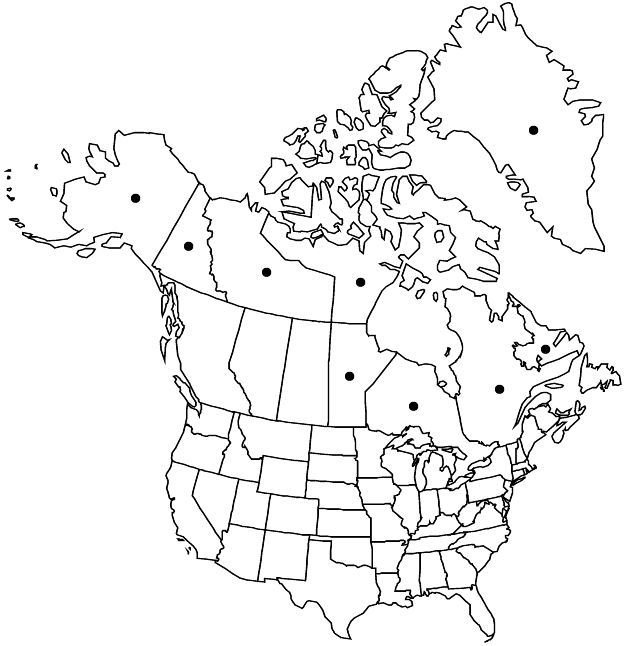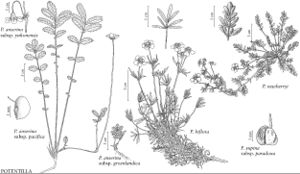Difference between revisions of "Potentilla anserina subsp. groenlandica"
Rosac. Monogr. 4: 13. 1824.
FNA>Volume Importer |
FNA>Volume Importer |
||
| Line 45: | Line 45: | ||
|elevation=0 m | |elevation=0 m | ||
|distribution=Greenland;Man.;Nfld. and Labr. (Labr.);N.W.T.;Nunavut;Ont.;Que.;Yukon;Alaska;Eurasia. | |distribution=Greenland;Man.;Nfld. and Labr. (Labr.);N.W.T.;Nunavut;Ont.;Que.;Yukon;Alaska;Eurasia. | ||
| − | |discussion=<p>The northern arctic plants have glabrous leaves and are compatible with <i>Potentilla</i> egedei. Some of the southern arctic and northern boreal plants in the Atlantic regions have leaves with white-hairy abaxial surfaces, more leaflets, often more pointed teeth, and slightly larger flowers. These are compatible with <i></i>subsp.<i> groenlandica</i> as originally described. The variation between these extremes is continuous. Both names are based on plants from Greenland, far north of the native range of <i></i>subsp.<i> anserina</i>, and are probably the same entity. Following the argument by J. Soják (1969) that trinomials by Trattinnick are subspecies, the epithet groenlandica has priority over egedei at this rank.</p> | + | |discussion=<p>The northern arctic plants have glabrous leaves and are compatible with <i>Potentilla</i> egedei. Some of the southern arctic and northern boreal plants in the Atlantic regions have leaves with white-hairy abaxial surfaces, more leaflets, often more pointed teeth, and slightly larger flowers. These are compatible with <i></i></i>subsp.<i><i> groenlandica</i> as originally described. The variation between these extremes is continuous. Both names are based on plants from Greenland, far north of the native range of <i></i></i>subsp.<i><i> anserina</i>, and are probably the same entity. Following the argument by J. Soják (1969) that trinomials by Trattinnick are subspecies, the epithet groenlandica has priority over egedei at this rank.</p> |
|tables= | |tables= | ||
|references= | |references= | ||
| Line 69: | Line 69: | ||
|publication year=1824 | |publication year=1824 | ||
|special status=Selected by author to be illustrated | |special status=Selected by author to be illustrated | ||
| − | |source xml=https://jpend@bitbucket.org/aafc-mbb/fna-data-curation.git/src/ | + | |source xml=https://jpend@bitbucket.org/aafc-mbb/fna-data-curation.git/src/f6b125a955440c0872999024f038d74684f65921/coarse_grained_fna_xml/V9/V9_185.xml |
|subfamily=Rosaceae subfam. Rosoideae | |subfamily=Rosaceae subfam. Rosoideae | ||
|tribe=Rosaceae tribe Potentilleae | |tribe=Rosaceae tribe Potentilleae | ||
Revision as of 21:35, 24 September 2019
Stems glabrous. Leaves horizontal or ascending, rarely erect, (1–)2–10 cm, rarely longer; leaflets 2–4(–5) per side, separate, teeth 2–6(–10) per side, teeth apex rounded to subacute, surfaces: abaxial with long hairs absent or sparse, on veins, cottony-crisped hairs absent, sometimes sparse to dense, adaxial glabrous. Flowers 0.8–1.5 cm diam.; epicalyx bractlets narrowly to broadly ovate-triangular, shorter than sepals, entire; hypanthium patelliform (wider than deep) in fruit; petals not overlapping, elliptic; carpels 25–60. Achenes without dorsal groove. 2n = 28, 35, 42.
Phenology: Flowering summer.
Habitat: Salt and brackish marshes, clayey and sandy seashores, driftwalls
Elevation: 0 m
Distribution

Greenland, Man., Nfld. and Labr. (Labr.), N.W.T., Nunavut, Ont., Que., Yukon, Alaska, Eurasia.
Discussion
The northern arctic plants have glabrous leaves and are compatible with Potentilla egedei. Some of the southern arctic and northern boreal plants in the Atlantic regions have leaves with white-hairy abaxial surfaces, more leaflets, often more pointed teeth, and slightly larger flowers. These are compatible with subsp. groenlandica as originally described. The variation between these extremes is continuous. Both names are based on plants from Greenland, far north of the native range of subsp. anserina, and are probably the same entity. Following the argument by J. Soják (1969) that trinomials by Trattinnick are subspecies, the epithet groenlandica has priority over egedei at this rank.
Selected References
None.
